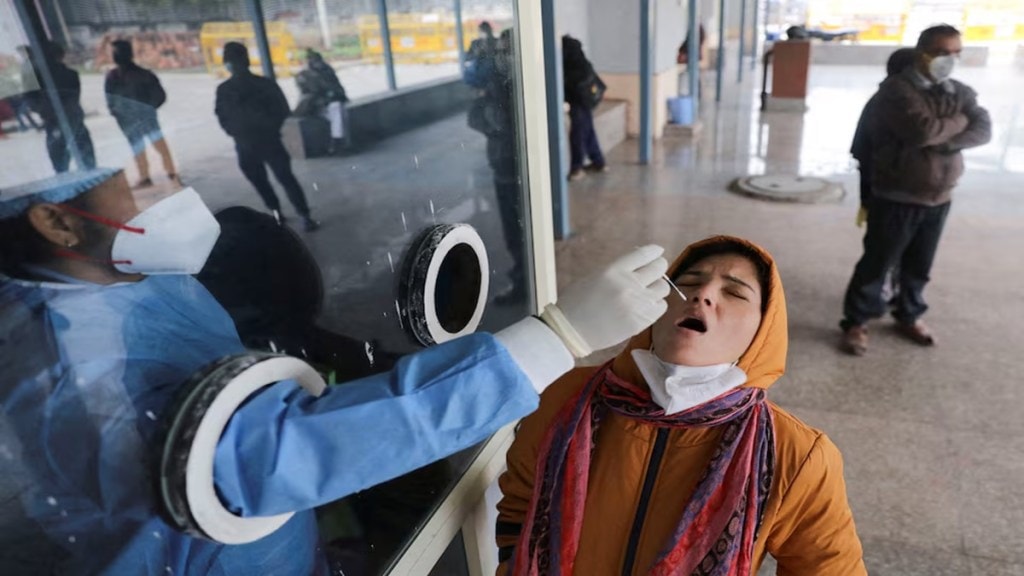India is witnessing a mild but growing resurgence in Covid-19 infections, prompting local authorities in several cities including Mumbai, Chennai, and Pune to step up surveillance and preparedness measures. The uptick coincides with a broader regional spike in cases reported across parts of Asia, including Hong Kong and Singapore, and comes amid concerns over newly emerged subvariants.
Spike in Covid cases in Mumbai
Mumbai has reported 95 Covid-19 cases so far in May, a significant share of Maharashtra’s total of 106 cases recorded since January, according to data released by the state health department. Sixteen patients are currently hospitalised, prompting officials to transfer some from KEM Hospital to Seven Hills Hospital in a bid to control further spread.
All patients presenting with influenza-like illness (ILI) or severe acute respiratory infection (SARI) are being tested for Covid-19, the department noted.
Gurgaon, Faridabad report fresh infections
In Haryana, three new Covid-19 infections have been confirmed—two in Gurugram and one in Faridabad—raising local health department alert levels. One of the cases in Gurugram involves a 31-year-old woman who had recently returned from Mumbai. The other is a 62-year-old male resident with no recent travel history. Both have been isolated.
In Faridabad, a 28-year-old security guard from the Sehtpur area (Palla) tested positive after experiencing flu-like symptoms and is seeking treatment at Delhi’s Safdarjung Hospital. His condition is stable, officials said.
Pune keeps hospital beds ready
While Pune has reported only a single Covid-19 case in May—an 87-year-old who has since recovered—civic authorities are not taking any chances. The Pune Municipal Corporation has reserved 50 beds at Naidu Hospital as a precautionary measure.
“We had only one case in May — an 87-year-old from Manjari, who has since recovered,” said Dr. Nina Borade, health chief at the Pune Municipal Corporation. She added that testing in civic hospitals is currently paused, pending revised guidelines from the central government.
Covid cases rise in Chennai
Tamil Nadu is also observing a gradual rise in cases, with 12 infections reported from Puducherry and an uptick in positive Covid-19 cases among patients in Chennai who were initially thought to be suffering from influenza.
“Two weeks ago, 60% of viral cases were influenza A or B. Now, it’s Covid-19,” said Dr. Subramaniam Swaminathan, an infectious diseases expert at Gleneagles Healthcity. He noted that some hospitals have postponed high-risk procedures like organ transplants and heart surgeries due to the recent rise in infections.
Public health director Dr. T S Selvavinayagam urged residents to exercise caution in crowded settings but reassured the public that the situation does not warrant panic. “Covid-19 never truly disappeared — it continues to circulate at low levels with seasonal surges,” he said.
Rising numbers in Gujarat and Karnataka
In Gujarat, seven new cases were reported in Ahmedabad in a single day—well above the city’s monthly average of one case. All patients are currently in home isolation, and genome sequencing has been initiated. The state now has 15 active cases, all confirmed to be of the Omicron subvariant JN.1, with no hospitalisations reported so far.
Karnataka has recorded 16 active cases, according to state health minister Dinesh Gundu Rao. No serious health outcomes have been associated with the latest infections.
What’s driving the current rise in Covid cases?
The recent increase in infections is being linked to the emergence of two new subvariants—OF.7 and NB.1.8—both of which are descendants of the JN.1 Omicron lineage. While JN.1 has been classified by the World Health Organization (WHO) as a “variant of interest,” its subvariants are drawing global scrutiny due to their heightened transmission potential.
The rise in cases is attributed to a mix of factors: the increased transmissibility of the new variants, waning population-level immunity, limited efficacy of older vaccines, greater social mobility, and reduced public adherence to preventive measures.
Globally, the trend is echoed by a 28% week-on-week rise in Covid-19 cases in Singapore as of early May. In Hong Kong, the test positivity rate has more than doubled over the past month, jumping from 6.21% to 13.66%.
Health experts caution that while the current wave remains relatively contained, the evolving variant landscape necessitates continued surveillance and agile public health responses.







